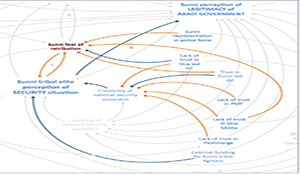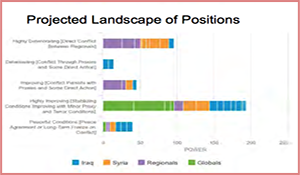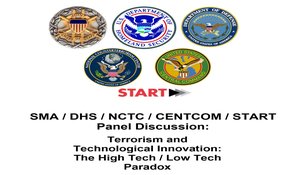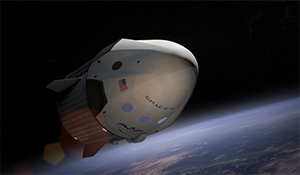
How to Position USG Against a Long Term ISIL Threat
What long-term actions and processes should U.S. government (USG) institutions, the Coalition and the international community examine to position ourselves against a long term ISIL threat? How can the private sector be effectively engaged by government institutions to optimize the effects needed for success? Executive Summary Expert contributors agree that terrorism will remain a long-standing […]
Continue ReadingWhole of Government Approach to Conflict
R4 Question #2: How could DoD and DoS be better postured to address regional and world conflicts to ensure a whole of government approach to identify and synchronize lines of effort in both planning and execution? Author | Editor: Canna, S. (NSI, Inc). Executive Summary Not many experts were willing to tackle this problem of […]
Continue ReadingIraq: Coalition or Bilateral Approach?
Question (R6.3): What is most favorable for the stability and the future of Iraq after the defeat of Da’esh: continued presence of an international Coalition or normal state-to-state bilateral relations? If a Coalition is the preferred option, what could be the “unifying factor” for a post-OIR coalition in Iraq and what situations could exist/emerge to […]
Continue ReadingNew Iran Strategy
Question (R6.6): How does USCENTCOM, working within a whole of government approach, coordinate military operations in support of the change in approach towards Iran from the previous to the current administration? Author | Editor: Jafri, A. (NSI, Inc). Executive Summary As battlefield successes actualize, decision makers have an opportunity to align tactical and operational policies […]
Continue Reading
Building Partner Capacity: Iraq
Question (R6.10): What can the U.S. and Coalition partners realistically do to enable Iraqi Security Forces (ISF) to combat a long-term ISIS insurgency? Recognizing the enormous resources the U.S. poured into the ISF from 2003 until 2011, only to see much of the force collapse in 2014, what can we do to avoid making the […]
Continue Reading
Denying the Seeds of Future Conflict
Question (R6.1): What conditions (demographic, political, etc.) should exist on the ground in the Middle Euphrates River Valley and the tri border (Syria/Jordan/Iraq) region to deny the seeds of future conflict from being planted – particularly taking into account the assumed intention of Iranian proxy forces to establish a Shia “land bridge?” Which of these […]
Continue ReadingCompetition Short of Armed Conflict with a Regional Power
Question (R6.7): Are there examples from US history of competition short of open conflict1 with a regional power? What lessons exist that may be applied to resolving competing US/Iran objectives short of open conflict? Which examples are most relevant—pre- or post-World War II? Author | Editor: Polansky (Pagano), S. (NSI, Inc.) Executive Summary The experts […]
Continue ReadingGlobal Power Competition
Question (R6.2): In the event that the US/Coalition is challenged by another global power [Russia for the purposes of this response], what are the second and third order effects in the USCENTCOM area of responsibility? Author | Editor: Jafri, A. (NSI, Inc). Executive Summary As Russia continues to challenge United States’ power and influence around […]
Continue Reading
Terrorism and Technological Innovation: The High Tech / Low Tech Paradox
Terrorism and Technological Innovation: The High Tech / Low Tech Paradox Panel Discussion Speakers: Braniff, B. (University of Maryland START); Ligon, G. (University of Nebraska, Omaha); Rassler, D. (Counterterrorism Center [CTC]) Date: 28 February 2018 Speaker Session Preview SMA hosted a panel discussion as a part of its SMA DHS NCTC CENTCOM START Speaker Series, […]
Continue Reading
Principles of Response to Aggression in Space
[Q18] What are the principles (e.g., flexible vs. controlled response; proportionality, etc.) upon which international policy makers should develop response options for aggression in space? A Virtual Think Tank (ViTTa)® Report. Author(s): Dr. John Stevenson (NSI, Inc.) Summary Response Upon considering the question of focus, several expert contributors argue that it is confusing or even […]
Continue Reading